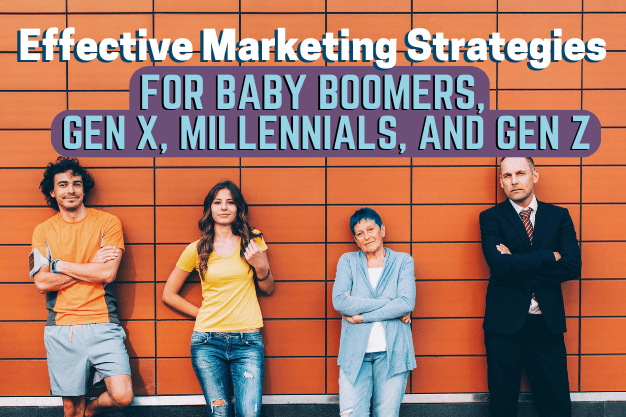In today’s dynamic and diverse marketplace, successful marketers understand the importance of connecting with different generations on a deeper level. By recognizing the unique tendencies, preferences, aspirations, dislikes, and purchase behaviors of Baby Boomers, Generation X, Millennials, and Generation Z, brands can craft authentic and resonant marketing strategies.
This article delves into the distinct characteristics of each generation, provides actionable insights, explores what they dislike in terms of marketing or promotion, and offers examples of what they might buy and why.
Baby Boomers: The Torchbearers of Tradition and Trust
Understanding Baby Boomers: Born between 1946 and 1964, Baby Boomers hold significant purchasing power and place importance on established values. They grew up in a post-war era and witnessed various social and cultural transformations.
Key Tendencies include:
- Embracing Traditional Media: Baby Boomers, often avid consumers of TV, radio, and print, respond positively to well-crafted advertisements on these channels. They are accustomed to these traditional media outlets and still appreciate the credibility and trust associated with them.
- Showcasing Brand Loyalty: This generation values long-term relationships with trusted brands that consistently deliver quality products and services. Once they find a brand they trust, they are likely to remain loyal and recommend it to others.
- Seeking Authenticity and Transparency: Baby Boomers appreciate sincere and transparent marketing messages that align with their core values. They value authenticity and expect brands to deliver on their promises.
- Emphasizing Quality and Reliability: Well-established brands with a reputation for durability and reliability are highly valued by Baby Boomers. They prioritize the quality and longevity of products over trendy or disposable options.
Marketing Strategies:
To effectively market to Baby Boomers, consider the following strategies:
- Nostalgic Storytelling: Engage Baby Boomers through captivating narratives that evoke fond memories and emphasize shared experiences. Use storytelling to transport them back to significant moments of their youth and connect with their emotions.
- Leveraging Traditional Channels: While embracing digital marketing, maintain a presence in traditional media, such as TV and print, to reach this generation effectively. Baby Boomers still rely on these platforms for news, entertainment, and information.
- Highlighting Trust and Credibility: Showcase testimonials, certifications, and endorsements to reinforce your brand’s reliability and build trust. Leverage case studies and success stories to demonstrate the positive experiences of Baby Boomer customers.
- Influencer Partnerships: Collaborate with influential figures from the Baby Boomer generation to enhance credibility and establish a genuine connection with this audience. Partnering with recognizable personalities or experts in their fields can help bridge the generation gap and build trust.
Dislikes: Baby Boomers dislike marketing that feels overly gimmicky or superficial. They are put off by the excessive use of jargon or marketing techniques that seem insincere. They prefer messages that are straightforward, and honest, and avoid excessive exaggeration or over-the-top claims.
Example Purchase: A Baby Boomer might buy a high-quality, classic wristwatch from a reputable brand known for its craftsmanship and timeless design. They value the durability, reliability, and sophistication that such a watch represents. The Baby Boomer appreciates the brand’s heritage and the trust associated with it.
Generation X: The Bridge Between Tradition and Innovation
Understanding Generation X: Born between 1965 and 1980, Generation X witnessed the rise of technology and the transition to a digital era. They grew up in an era of economic and societal changes, often characterized as the “latchkey kids” or the MTV generation.
Key Tendencies:
- Embracing Digital Adoption: Generation X was at the forefront of the digital revolution, embracing personal computers and the internet. They adapted to technology and are comfortable navigating digital platforms.
- Seeking Convenience: Brands that offer seamless online experiences, personalized recommendations, and time-saving solutions resonate with Generation X. They appreciate brands that understand their busy schedules and provide hassle-free solutions.
- Value-Consciousness: Generation X came of age during economic recessions and witnessed fluctuating financial conditions. They appreciate the balance between quality and affordability, seeking products that offer the best value for their money.
- Privacy and Security Awareness: Having experienced the technological shift, this generation is more cautious about sharing personal information. They value brands that prioritize data security and protect their privacy.
Marketing Strategies:
To effectively market to Generation X, consider the following strategies:
- Digital Optimization: Establish a strong online presence through optimized websites, mobile apps, and targeted digital advertising to effectively engage Generation X. Ensure your digital platforms are user-friendly, responsive, and provide seamless experiences.
- Convenience-Driven Approach: Provide hassle-free purchasing options, personalized recommendations, and efficient customer service to cater to their time-sensitive lifestyles. Generation X appreciates brands that simplify their decision-making process and offer solutions that save them time and effort.
- Value Proposition: Highlight competitive pricing, promotions, discounts, and loyalty programs to appeal to Generation X’s desire for value and savings. Show them how your product or service offers long-term affordability and a solid return on investment.
- Data Security Assurance: Assure Generation X that their personal information is protected by employing secure payment gateways and transparent privacy policies. Demonstrate your commitment to data security and emphasize how you prioritize their privacy and peace of mind.
Dislikes: Generation X dislikes intrusive marketing tactics, such as excessive email spam or unsolicited phone calls. They are also put off by brands that make false promises or use misleading advertising. Generation X appreciates brands that respect their privacy and value their time by delivering relevant and non-intrusive marketing messages.
Example Purchase: A Generation X individual might buy a versatile and durable backpack that combines functionality, style, and affordability. They appreciate the convenience and practicality of a backpack that can accommodate their busy lifestyles, whether for work, travel, or outdoor activities. Generation X values products that offer the best balance of quality and price.

Millennials: Forging Authentic Connections in the Digital Age
Understanding Millennials: Born between 1981 and 1996, Millennials are digital natives who came of age during a time of rapid technological advancements and witnessed the shift towards a more connected world.
Key Tendencies:
- Digital Natives: Millennials have grown up immersed in digital platforms and expect seamless online experiences across various devices. They are comfortable with technology and rely on it for information, communication, and entertainment.
- Authenticity and Personalization: Brands that authentically reflect Millennial values, tailor their offerings, and provide personalized recommendations can forge strong connections. Millennials appreciate brands that genuinely understand their needs and aspirations.
- User-Generated Content: Millennials trust peer recommendations and user-generated content, valuing the opinions and experiences of real people over traditional advertising. They actively seek out and engage with content created by their peers.
- Experience-Oriented Mindset: Millennials prioritize unique experiences over material possessions. They seek brands that align with their values, promote social responsibility, and offer memorable experiences.
Marketing Strategies:
To effectively market to Millennials, consider the following strategies:
- Social Media Engagement: Leverage platforms such as Instagram, TikTok, Snapchat, and YouTube to authentically connect with Millennials through visually appealing and shareable content. Use these platforms to showcase your brand’s personality and engage in meaningful conversations.
- Influencer Collaborations: Collaborate with relevant influencers who resonate with Millennial interests and values to amplify brand messages and foster trust. Influencers can provide an authentic voice and bridge the gap between your brand and the Millennial audience.
- User-Generated Content Campaigns: Encourage Millennials to participate in user-generated content initiatives, contests, and challenges that foster engagement and cultivate brand loyalty. Leverage their creativity and enthusiasm to co-create content that reflects their experiences and builds a sense of community around your brand.
- Experiential Marketing: Create immersive brand experiences through events, online interactive campaigns, and cause-driven initiatives to captivate Millennials and forge lasting connections. Offer opportunities for Millennials to engage with your brand beyond transactions and be part of something meaningful.
Dislikes: Millennials dislike overly promotional and intrusive marketing. They are turned off by generic and irrelevant advertisements that do not align with their interests or values. Millennials also dislike brands that use excessive sales pitches or come across as too sales-focused. They appreciate brands that are genuine, and transparent, and provide value through meaningful content and experiences.
Example Purchase: A Millennial might buy sustainably sourced and ethically produced clothing from a brand that embraces environmental and social responsibility. They prioritize brands that align with their values and offer products that contribute to a more sustainable and conscious future. The Millennial values transparency, authenticity, and the positive impact their purchase can have on the world.
Generation Z: The Digital Natives with a Purpose
Understanding Generation Z: Born between 1997 and 2012, Generation Z is the first truly digital-native generation. They have grown up in an era of smartphones, social media, and instant connectivity.
Key Tendencies:
- Digital Fluency: Generation Z is highly adept at navigating digital platforms and relies on them for communication, entertainment, and information. They expect brands to have a strong online presence.
- Diversity and Inclusivity: This generation values diversity, inclusivity, and social justice. They expect brands to embrace these values and take a stand on relevant social and environmental issues.
- Authenticity and Transparency: Generation Z craves authentic and transparent brand communication. They can quickly spot inauthentic marketing attempts and appreciate brands that are genuine and open in their messaging.
- Short Attention Span: Growing up in the era of bite-sized content, Generation Z has a shorter attention span. They prefer concise and visually engaging content that captures their interest quickly.
Marketing Strategies:
To effectively market to Generation Z, consider the following strategies:
- Social Media Dominance: Generation Z is highly active on platforms such as TikTok, Instagram, Snapchat, and YouTube. Utilize these platforms to create engaging and visually appealing content that aligns with their values and interests.
- Purpose-Driven Marketing: Emphasize your brand’s commitment to social and environmental causes that Generation Z cares about. They appreciate brands that actively contribute to positive change and demonstrate their values through actions.
- Authentic Influencer Collaborations: Collaborate with authentic influencers who genuinely resonate with Generation Z’s interests and values. Avoid influencer partnerships that feel forced or inauthentic.
- Snackable Content: Create concise and visually appealing content that can quickly capture Generation Z’s attention. Utilize videos, graphics, and interactive elements to make your message more engaging and memorable.
Dislikes: Generation Z dislikes overtly promotional and intrusive marketing tactics. They are wary of brands that do not align with their values or attempt to manipulate them through misleading or insincere advertising. Generation Z also dislikes content that feels overly long or lacks visual appeal, as their short attention span makes them more responsive to concise and visually engaging content.
Example Purchase: A member of Generation Z might buy cruelty-free beauty products from a brand that actively supports animal rights and has transparent sourcing and production practices. They prioritize brands that align with their values of compassion, sustainability, and social responsibility. Generation Z values authenticity, transparency, and the positive impact their purchase can have on the environment and society.

Building successful marketing strategies involves understanding and respecting the unique characteristics, preferences, aspirations, dislikes, and purchase behaviors of different generations. By cultivating authenticity, embracing innovation, and crafting tailored approaches, businesses can create meaningful connections with Baby Boomers, Generation X, Millennials, and Generation Z.
Remember, these examples are meant to illustrate potential purchase preferences and motivations, and individual preferences may vary within each generation. Continuous research, adaptation, and experimentation are essential to staying relevant and engaging with the ever-evolving consumer landscape.

